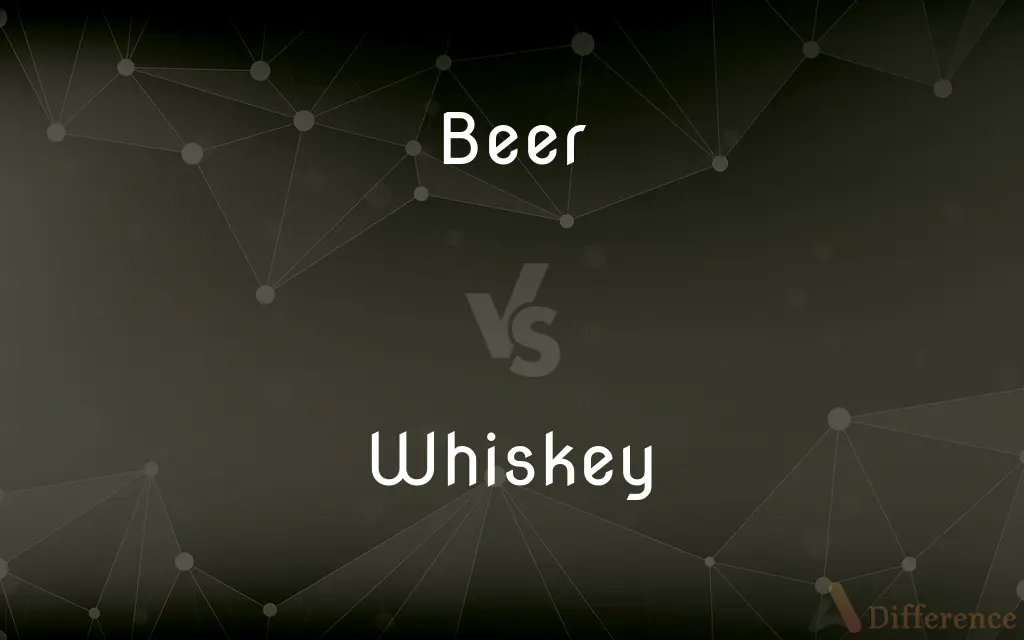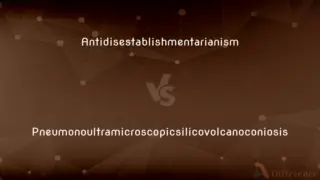Beer vs. Whiskey — What's the Difference?
Edited by Tayyaba Rehman — By Fiza Rafique — Updated on April 14, 2024
Beer is a fermented, typically carbonated beverage made from malted barley and hops, known for its lower alcohol content, whereas whiskey is a distilled spirit made from various grains, aged in wooden casks, with a higher alcohol concentration.

Difference Between Beer and Whiskey
Table of Contents
ADVERTISEMENT
Key Differences
Beer is brewed through fermentation, primarily of malted barley and hops, resulting in a diverse range of flavors and strengths, whereas whiskey undergoes distillation, which concentrates its alcohol content and flavors from grains like corn, rye, or barley.
The typical alcohol content of beer ranges from about 3% to 12%, making it generally lighter in alcohol compared to whiskey, which typically contains 40% to 50% alcohol by volume.
Beer is often enjoyed in larger quantities given its lower alcohol content and is commonly served in pints or bottles, on the other hand, whiskey is usually consumed in smaller servings, such as shots or neat in a whiskey glass.
The flavor profile of beer can vary widely from bitter to sweet, influenced by the type and amount of hops and malts used, whereas whiskey's flavor is deeply impacted by the aging process in wooden casks, gaining complexity over time.
Beer is typically carbonated, adding a bubbly texture, whereas whiskey is a still beverage with a smooth to fiery texture depending on its distillation and aging process.
ADVERTISEMENT
Comparison Chart
Production
Brewed through fermentation
Distilled and then aged
Base Ingredients
Malted barley, hops, water, and yeast
Various grains (e.g., corn, barley, rye)
Alcohol Content
Typically 3%-12%
Typically 40%-50%
Serving Size
Often served in pints or bottles
Served in shots or neat
Texture
Carbonated and bubbly
Still and smooth to fiery
Compare with Definitions
Beer
Beer is a fermented alcoholic beverage made from malted barley and hops.
Beer comes in various styles, including lagers and ales.
Whiskey
Whiskey typically has a higher alcohol content than beer.
Most whiskeys are around 40% to 50% alcohol by volume.
Beer
Beer is carbonated, contributing to its refreshing taste.
The carbonation in beer gives it a bubbly texture.
Whiskey
Whiskey is a distilled alcoholic beverage made from fermented grain mash.
Common grains used in whiskey include corn, rye, and barley.
Beer
It can have a wide range of flavors, from bitter to fruity.
IPAs are known for their hoppy bitterness.
Whiskey
Whiskey can be served neat, with water, or on the rocks.
Some prefer whiskey neat to fully enjoy its taste.
Beer
Beer is often consumed in social settings.
Pubs and bars frequently serve a wide range of beers on tap.
Whiskey
It is aged in wooden casks, which influences its flavor.
Whiskey often develops a rich, complex flavor profile during aging.
Beer
It is typically lower in alcohol than spirits.
Most beers contain between 3% and 12% alcohol by volume.
Whiskey
It is enjoyed in smaller quantities due to its strength.
Whiskey is often sipped slowly to appreciate its flavors.
Beer
Beer is one of the oldest and most widely consumed alcoholic drinks in the world, and the third most popular drink overall after water and tea. Beer is brewed from cereal grains—most commonly from malted barley, though wheat, maize (corn), rice, and oats are also used.
Whiskey
An alcoholic liquor distilled from grain, such as corn, rye, or barley, and containing approximately 40 to 50 percent ethyl alcohol by volume.
Beer
A fermented alcoholic beverage brewed from malt, usually flavored with hops.
Whiskey
A drink of such liquor.
Beer
A fermented beverage brewed by traditional methods that is then dealcoholized so that the finished product contains no more than 0.5 percent alcohol.
Whiskey
A liquor distilled from the fermented mash of grain (as rye, corn, or barley).
Beer
A carbonated beverage produced by a method in which the fermentation process is either circumvented or altered, resulting in a finished product having an alcohol content of no more than 0.01 percent.
Whiskey
A drink of whiskey.
Beer
A beverage made from extracts of roots and plants
Birch beer.
Whiskey
(historical) A light gig or carriage; a tim-whiskey.
Beer
A serving of one of these beverages.
Whiskey
(international standards) nodot=1 NATO/ICAO Phonetic Alphabet.}}
Beer
(uncountable) An alcoholic drink fermented from starch material, commonly barley malt; often with hops or some other substance (like gruit) to impart a bitter flavor.
Beer is brewed all over the world.
Whiskey
Same as Whisky, a liquor.
Beer
(uncountable) A fermented extract of the roots and other parts of various plants, as spruce, ginger, sassafras, etc.
Whiskey
A light carriage built for rapid motion; - called also tim-whiskey.
Beer
(uncountable) A solution produced by steeping plant materials in water or another fluid.
Whiskey
A liquor made from fermented mash of grain
Beer
(countable) A glass, bottle, or can of any of the above beverages.
I bought a few beers from the shop for the party.
Can I buy you a beer?
I'd like two beers and a glass of white wine.
Beer
(countable) A variety of the above beverages.
Pilsner is one of the most commonly served beers in Europe.
I haven't tried this beer before.
Beer
(nonstandard) One who is or exists.
Beer
To give beer to (someone)
Beer
A fermented liquor made from any malted grain, but commonly from barley malt, with hops or some other substance to impart a bitter flavor.
Beer
A fermented extract of the roots and other parts of various plants, as spruce, ginger, sassafras, etc.
Beer
A general name for alcoholic beverages made by fermenting a cereal (or mixture of cereals) flavored with hops
Common Curiosities
Can beer be aged like whiskey?
Some beers, like barleywines or stouts, can be aged, but typically not as long as whiskey.
What does it mean for whiskey to be 'neat'?
Whiskey served 'neat' is poured straight into a glass with no ice or water.
Why is beer carbonated?
Carbonation in beer occurs naturally from fermentation and is often enhanced during bottling to improve its texture and taste.
What are the effects of aging on whiskey?
Aging can significantly enhance whiskey's flavors and smoothness.
How is whiskey made?
Whiskey is made by distilling fermented grain mash and aging it in wooden barrels.
What types of grains are used in whiskey?
Whiskey can be made from corn, barley, rye, and wheat.
Can beer be distilled into a spirit?
Yes, beer can technically be distilled into a spirit, known as a distilled beer or malt whiskey.
What is the main ingredient in beer?
The main ingredients in beer are malted barley and hops.
How does the alcohol content of beer compare to whiskey?
Beer generally has a lower alcohol content than whiskey, ranging from 3% to 12% versus 40% to 50% for whiskey.
How do the serving temperatures of beer and whiskey compare?
Beer is usually served chilled, while whiskey is typically served at room temperature or slightly chilled.
Is beer or whiskey more popular globally?
Beer is generally more widely consumed globally than whiskey.
How should whiskey be stored?
Whiskey should be stored upright in a cool, dark place to preserve its quality.
What are the health impacts of consuming beer and whiskey?
Both beer and whiskey should be consumed in moderation; excessive consumption can lead to health issues.
Are there non-alcoholic versions of beer and whiskey?
Non-alcoholic beers are widely available, while non-alcoholic whiskeys are less common but emerging in the market.
What role does water play in the production of whiskey and beer?
Water is crucial in both brewing beer and diluting whiskey mash before fermentation.
Share Your Discovery

Previous Comparison
Alcohol vs. InositolAuthor Spotlight
Written by
Fiza RafiqueFiza Rafique is a skilled content writer at AskDifference.com, where she meticulously refines and enhances written pieces. Drawing from her vast editorial expertise, Fiza ensures clarity, accuracy, and precision in every article. Passionate about language, she continually seeks to elevate the quality of content for readers worldwide.
Edited by
Tayyaba RehmanTayyaba Rehman is a distinguished writer, currently serving as a primary contributor to askdifference.com. As a researcher in semantics and etymology, Tayyaba's passion for the complexity of languages and their distinctions has found a perfect home on the platform. Tayyaba delves into the intricacies of language, distinguishing between commonly confused words and phrases, thereby providing clarity for readers worldwide.
















































